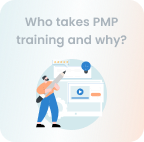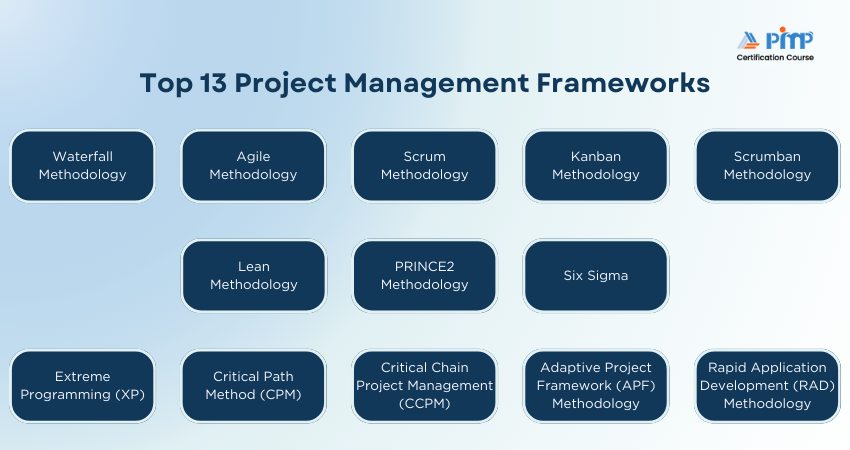







 10 Sep 2024
10 Sep 2024



In the ever-changing world of Project Management, choosing suitable methodologies can make or break your project's success. Our blog delves into Project Management Methodologies, from traditional frameworks to cutting-edge approaches. See how these methods can simplify your processes and improve outcomes, no matter how big or complex your project is.
Table of Contents
1) What is a Project Management Methodology?
2) 13 Project Management Methodology Examples and Frameworks
a) Waterfall Methodology
b) Agile Methodology
c) Scrum Methodology
d) Kanban Methodology
e) Scrumban Methodology
f) Lean Methodology
g) PRINCE2 Methodology
h) Six Sigma
i) Extreme Programming (XP)
j) Critical Path Method
3) Conclusion
Project Management Methodology is like a structured game plan for handling projects. It gives you a set of rules and best practices to follow so your team can be on track and achieve your project goals. Using a methodology helps teams stay consistent, efficient, and high-quality. Each methodology optimizes resource, risk, and deadline management. Project Risk Management enhances control.

Explore 13 diverse Project Management Methodologies and frameworks, each offering unique strengths and approaches tailored to different project needs. This will help you understand and choose the right methodology to optimize your Project Management strategy from traditional to innovative practices.

The Waterfall methodology is like a step-by-step process where you must finish one phase before moving on to the next. It's not so great for making changes on the fly since it's rigid, but it makes it easy to keep track of everything.
The agile methodology is about being flexible and progressing through small, incremental changes. It's focused on working closely together, listening to customers' feedback, and adapting quickly. This makes it perfect for projects where the requirements might change as we go along.
A subset of Agile, Scrum emphasizes iterative progress through sprints, typically lasting 2-4 weeks. Teams work in short, focused cycles, with regular reviews and adaptations, fostering rapid development and continuous improvement.
Kanban uses a board with columns showing different stages of a process. As tasks move across the board, teams can keep track of work and limit the number of tasks in progress to improve efficiency.
Scrumban is a hybrid of Scrum and Kanban. It blends Scrum's iterative approach with Kanban's visual management and flow optimization, making it a key aspect of Hybrid Project Management. This gives users flexibility while organizing things with structured planning and review processes.
Lean methodology is all about maximizing value while eliminating waste. It's about making things run smoother by removing unnecessary steps and using the best resources. Many companies in manufacturing and services use it to work smarter.
PRINCE2 stands for PRojects IN Controlled Environments. It is a structured method that breaks projects down into manageable stages. It focuses on clear roles, organized planning, and control, providing a solid framework for managing complex projects.
Six Sigma improves things by finding and fixing process defects and variations. It uses statistics to analyze data and achieve as close to perfect performance as possible. It is used extensively in manufacturing and services.
Extreme Programming is an Agile approach focused on improving software quality through frequent releases, continuous feedback, and close customer collaboration. It emphasizes practices such as pair programming and test-driven development.
The critical path method finds the most extended sequence of dependent tasks in a project, called the critical path. By concentrating on these tasks, CPM helps to schedule and manage time effectively to ensure the project gets done on time.
CCPM is a methodology that builds on CPM by considering resource constraints and buffers to protect the project schedule. It focuses on optimizing project timelines by addressing resource availability and potential delays.
APF is a methodology inspired by Agile. It emphasizes adaptability, iterative development, stakeholder collaboration, and flexibility, making it appropriate for projects with evolving requirements.
RAD is an Agile approach focused on rapid development and quick delivery of prototypes. It emphasizes iterative development, user feedback, and frequent releases, aiming to accelerate the development process and improve user satisfaction.
Understanding different project management methodologies helps tackle project challenges effectively; tools like Wrike and Asana Airtable enhance workflow and collaboration. Whether you prefer Waterfall's structured approach or Agile's flexibility, selecting the proper method can significantly impact your project's success. Dive into these methodologies, adapt them to your needs, and watch your projects thrive.






© Copyright 2025. All rights reserved. Contact: PMP® TRAINING ACADEMY.


